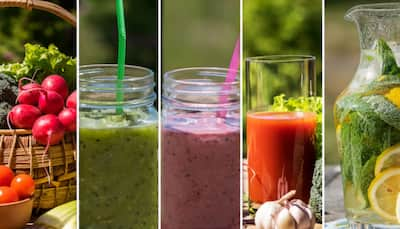Heart health experts have revealed the foods that could mimic the effects of statins, such as lowering cholesterol levels. Cardiologists from the British Heart Foundation (BHF) have highlighted two natural alternatives that research has shown to positively impact cholesterol. Countless foods and supplements claim to help lower cholesterol levels, a key factor in maintaining heart health.
High blood cholesterol can increase the risk of heart disease and other circulatory problems. Cholesterol comes in two forms: High LDL levels can lead to fatty deposits, or plaques, within artery walls. Over time, these plaques can harden and narrow the arteries, restricting blood flow, reports Surrey Live .

This reduced blood circulation to vital organs, especially the heart and brain, increases the chances of suffering a heart attack, stroke, or peripheral artery disease. If a piece of plaque breaks off, it can travel through the bloodstream, potentially causing a blood clot that blocks an artery, which could result in a heart attack or stroke. High cholesterol levels can lead to other health issues, including hypertension and diabetes, which in turn increase the risk of heart disease.
Certain foods contain natural compounds that can lower cholesterol in a similar way to statin drugs. These beneficial foods are rich in soluble fibre, plant sterols and stanols, and omega-3 fatty acids. Statins function by blocking an enzyme (HMG-CoA reductase) in the liver that is vital for cholesterol production.
This reduces the amount of 'bad' cholesterol (LDL) in the blood and may stabilise plaque in arteries. Some foods, such as oats and plant sterols, also help the liver remove more cholesterol from the blood to produce bile. While some foods can aid in lowering cholesterol, it's crucial to note that no single food or dietary change can match the effectiveness of statin medications in reducing cholesterol.
However, certain foods can help lower cholesterol levels as part of lifestyle changes and should be considered as part of a wider strategy for maintaining heart health. Statins, potent drugs that significantly lower cholesterol levels, should be taken as directed by a doctor. Alongside medication, maintaining a balanced diet, regular exercise, and a healthy weight are key to managing cholesterol levels.
It's crucial to consult your GP before making significant dietary changes or considering alternative treatments. Oats are packed with a soluble fibre called beta-glucan, which is instrumental in reducing cholesterol levels. When consumed, beta-glucan turns into a gel-like substance in the digestive system, effectively trapping bile acids rich in cholesterol and preventing them from entering the bloodstream.
Consequently, the liver has to pull more cholesterol from the blood to produce bile, thus lowering LDL cholesterol levels. Statins can also achieve this. By suppressing cholesterol production in the liver, statins prompt the liver to use more of the cholesterol already in the blood for bile production.
This process aids in reducing LDL cholesterol levels in the blood. Research suggests that consuming beta-glucans as part of a balanced diet may result in a modest decrease in cholesterol levels. A thorough analysis of 58 controlled trials, published in the British Journal of Nutrition , found that middle-aged individuals who consumed 3.
5g of beta-glucan from oat products daily for three to twelve weeks experienced a 4.2% reduction in 'bad' cholesterol compared to those who did not include it in their diet. The FDA recommends a daily intake of 3g of oat beta-glucan to help lower LDL cholesterol levels.
According to the BFH, "A 40g serving of porridge oats contains 2g of beta-glucan, while a 250ml glass of oat milk contains 1g of beta-glucans. However, there is no research linking oats to a lower risk of heart attack or stroke." Rich in fibre, oats help reduce cholesterol levels, promote heart health, and support overall well-being.
Whether you choose rolled oats, steel-cut oats, or oat bran, each type is rich in beta-glucan, which helps lower cholesterol. Incorporating oats into your meals is easy. You can enjoy a warm bowl of oatmeal for breakfast, mix them into your favourite baked goods, or add them to soups and casseroles for extra nutrition.
Certain margarines, milks, and yoghurts boast cholesterol-lowering claims, thanks to their enrichment with plant sterols and stanols, also known as phytosterols. These compounds are scientifically backed to aid in reducing cholesterol levels. A thorough analysis of 124 studies, featured in the British Journal of Nutrition back in 2014, disclosed that a daily intake of up to 3.
3 grams of phytosterols can lead to a gradual decrease in 'bad' low-density lipoprotein (LDL) cholesterol by 6% to 12% over an estimated four-week period. Phytosterols, due to their structural similarity to cholesterol, vie for absorption within the intestines, effectively lowering the amount of cholesterol that makes its way into the bloodstream. While small amounts of phytosterols are naturally present in a variety of plant-based foods such as fruits, vegetables, oils, nuts, and grains, the average consumption is typically under 600mg per day – far below the potent 2g found in fortified dairy products.
The Association of UK Dietitians has stated: "Along with a healthy diet, eating foods that provide you with around 2g of plant stanols and sterols every day has been shown to reduce blood cholesterol levels." However, the British Heart Foundation (BHF) cautions: "While plant sterols and stanols may lower your cholesterol, there have been no clinical trials that show they lower the risk of heart attack and stroke. In contrast, statins have been shown to reduce both your cholesterol levels and your risk of having a heart attack and stroke.
" While plant sterols and stanols can aid in reducing cholesterol, they should not replace statin medication. They can, however, complement a healthy lifestyle and statins to further lower cholesterol levels. Statins, plant sterols and stanols are generally deemed safe, with statins being the most effective at lowering LDL cholesterol and overall cardiovascular risk.
For an effective reduction in cholesterol levels, it's often recommended to choose fortified foods that provide a sufficient dose of plant sterols or stanols, as natural sources usually don't provide enough. Before making significant dietary changes or adding plant sterols and stanols for cholesterol management, it's prudent to seek advice from a healthcare professional or a registered dietitian, especially if you have existing health conditions or are on medication..
Health

Cardiologists identify two cholesterol-lowering foods that 'work similar to statins'

Cholesterol experts at the British Heart Foundation say two foods can lower cholesterol levels in similar ways to how statins work.















